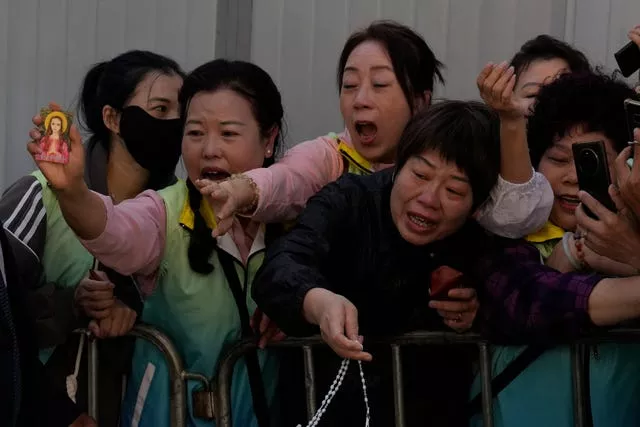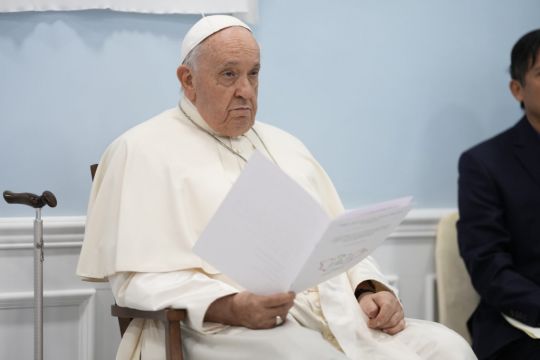Pope Francis has wrapped up the first ever papal visit to Mongolia by inaugurating a church-run homeless clinic and shelter, insisting that such initiatives are not aimed at winning converts but are simply exercises in Christian charity.
Francis toured the House of Mercy, a three-storey structure housed in an old school, which the local church has opened as an expression of the roots that it has taken in the three decades that the Catholic Church has had an official presence in Mongolia.
It was the final event of an historic four-day visit to a region where the Holy See has long sought to make inroads.
Dear brothers and sisters of #Mongolia, thank you for the gift of friendship that I received in these days. Bayarlalaa! May God bless you. You are in my heart, and in my heart you will remain. Remember me, please, in your prayers and in your thoughts. #ApostolicJourney
— Pope Francis (@Pontifex) September 4, 2023
Advertisement
Several of the foreign-staffed Catholic religious orders in Mongolia run shelters, orphanages and nursing homes to care for a population of 3.3 million where one in three people lives in poverty.
But the new clinic for homeless people, people with disabilities and victims of domestic violence is aimed at showing the outreach of the Mongolian Catholic Church as a whole to its local community.
“The true progress of a nation is not gauged by economic wealth, much less by investment in the illusory power of armaments, but by its ability to provide for the health, education and integral development of its people,” Francis said at the shelter, urging Mongolians both rich and poor to volunteer to help their fellow citizens.
Currently, some 77 missionaries minister to Mongolia’s Catholics, who with around 1,450 people constitute one of the tiniest Catholic flocks in the world.

But only two Mongolian men have been ordained priests, and no Mongolian women have decided to join religious congregations as nuns.
These foreign missionaries say the biggest challenge facing them is to cultivate a truly local Mongolian church, with trained lay people who are well inserted into the fabric of society.
That, they hope, will eventually lead to more religious vocations so that foreign missionaries become less and less necessary.
The Rev Ernesto Viscardi, an Italian priest of the Consolata missionary order who has been based in Mongolia for 19 years, said: “We have to make this a church of Mongolia, one that has the flavour of this land, of its steppes, of its sheep, goats, of its ger.
“There are 77 of us missionaries. We’re all great, all saints, everyone works well,” he said laughing.

“But we have to think about making the local church grow, so that the (Mongolian) people take their church in hand. Otherwise we colonize Mongolia anew, and that makes no sense.”
In urging everyday Mongolians to volunteer to help the poor, Francis said charity work was not just for the idle rich but for everyone.
And he denied that Catholic charity was about winning new converts.
Francis said: “Another myth needing to be dispelled is that the Catholic Church, distinguished throughout the world for its great commitment to works of social promotion, does all this to proselytise, as if caring for others were a way of enticing people to ‘join up’.

“No! Christians do whatever they can to alleviate the suffering of the needy, because in the person of the poor they acknowledge Jesus, the Son of God, and in him the dignity of each person.”
Francis’ comment was a tacit acknowledgement of the competition for souls in places like Mongolia, which banned religious observation during decades of Soviet-allied communist government.
Now, religious freedom is enshrined in the Mongolian constitution, and a variety of Christian and evangelical churches have taken root here.
Some, such as the Church of Jesus Christ of Latter Day Saints, boast a much bigger presence in Mongolia and claim far more members than the Catholic Church. But in a sign that Catholics were not competing with the Mormons or other Christian churches, Francis invited their leaders to an interfaith meeting on Saturday in Ulaanbaatar to show their common concern for promoting a more peaceful and harmonious world.
It is not necessary to be wealthy to do good. Rather, it is almost always common people who devote their time, skills and heart to caring for others. #ApostolicJourney #Mongolia
— Pope Francis (@Pontifex) September 4, 2023
In seeking to encourage Mongolia’s tiny Catholic flock, Francis has insisted that their small size doesn’t matter and that their success shouldn’t be measured in numbers.
“God loves littleness, and through it he loves to accomplish great things,” Francis told priests, nuns and bishops from around the region during a Saturday encounter in the cathedral.
Francis came to Mongolia to give a word of hope to the young church, but also to make a geopolitically important foray into a troubled region for the Holy See, particularly given neighbouring China’s crackdown on religious observance.
Meanwhile, Francis insisted that the Vatican’s relations with China were going well but said work must still be done to show Beijing that the Catholic Church is not beholden to a foreign power.
Francis spoke about the Holy See’s dealings with China during a press conference en route home from Mongolia, where Beijing and its crackdown on religious minorities overshadowed an otherwise historic first papal visit to the majority Buddhist nation.

Francis sent a telegram of greetings to Chinese President Xi Jinping as his aircraft flew through China’s airspace coming and going to Mongolia.
The pontiff also gave a special shout-out to the Chinese people at the end of his main Mass in Ulaanbaatar. He brought up to the altar the current and retired bishops of Hong Kong to demonstrate his “warm” affection for the Chinese people.
But relations remain strained, particularly over a five-year-old agreement on nominating Catholic bishops.
The 2018 accord aimed to unite China’s estimated 12 million Catholics, who have been divided between an official church and an underground church loyal to Rome. The latter emerged when the Communists came to power and diplomatic relations between the Holy See and China ruptured.
On Monday in Beijing, Foreign Ministry spokesperson Mao Ning was asked about the pope’s Sunday greeting to the Chinese people.

“We have seen relevant reports, and my colleagues have introduced China’s position earlier. China has always taken a positive attitude towards improving relations with the Vatican and has maintained contact and communication with the Vatican.”
The terms of the 2018 deal were never released. But Beijing has made a handful of unilateral bishop appointments without papal consent, an apparent violation of the accord. The Vatican gave in and recognised the appointments after the fact.
Francis insisted that relations were “very respectful” and said he retained “great admiration for the Chinese people.”
“I think there’s more work to be done on the religious aspect to understand ourselves better, so the Chinese citizens don’t think that the church doesn’t accept their culture or values, or that the church depends on another foreign power,” he said. “So the relations are like this, under way.”







